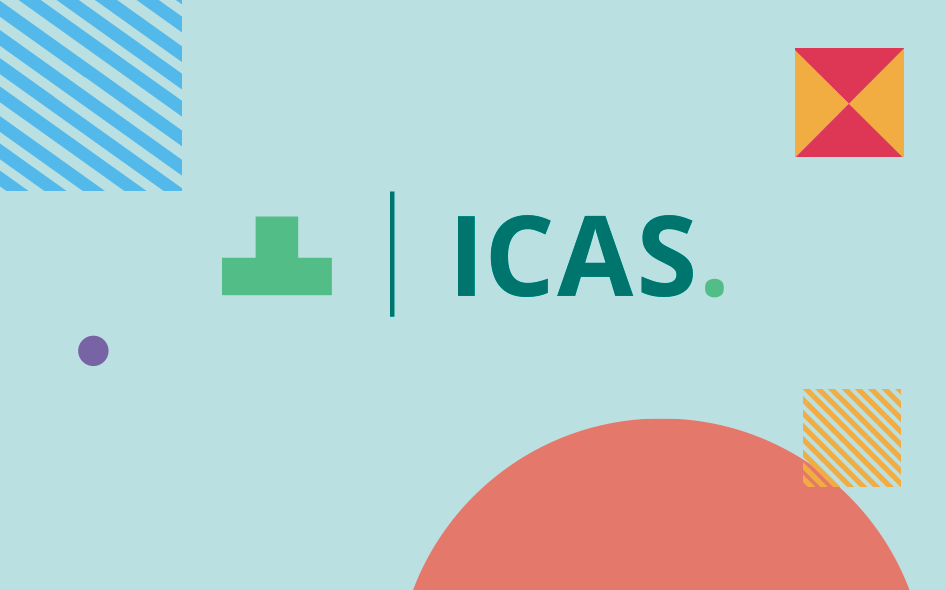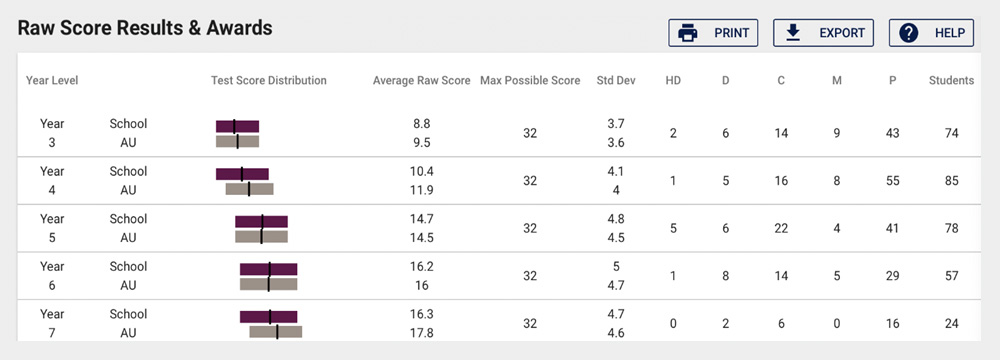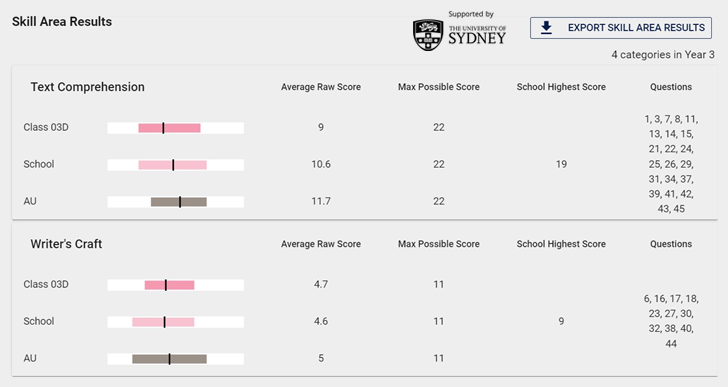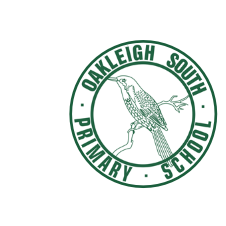
ICAS is a historic academic competition that has been sat by over 10 million school students from 16,000 schools across 41 countries since 1981.
It recognises academic performance in a way similar to sports or the arts, with engaging, fun questions designed by psychometricians, education measurement experts and experienced teachers to test students’ higher-order thinking skills.
ICAS also provides rich insights into students’ strengths and weaknesses, helping teachers to accelerate learning outcomes and unlock student potential.
Sitting an ICAS test is a milestone shared by generations of students. These are some of the biggest benefits for students and schools.
ICAS competitions are available in six literacy and STEM subjects across most year levels
See ICAS key dates and sitting windows in Australia, New Zealand and internationally.
ICAS assessments are priced individually so you can select your preferred tests.
Discover the tested skills and subjects for each year level, as well as subjects and exam papers by country.
How we celebrate the fantastic achievements of ICAS participants, including medal winners.
Resources and guides for schools, teachers, students and parents to make the most of ICAS.
ICAS reports include detailed breakdowns of student performance for each subject and skill level. When combined with other assessment data, you can make better decisions for every student.

Make direct comparisons of students writing abilities across year levels to see how they’ve progressed, and make improvement to your writing programs.

Discover knowledge gaps for students, classes, and cohorts, and refine your teaching programs to fill them.

See exactly how each student is performing for each subject, so that you can place them in the most appropriate class or group for their skill level.




Give your child or students the opportunity to practise and prepare before exam day with our past papers.
Help your child prepare for ICAS with RiSE+ online practice tests, created by ICAS assessment writers and hosted on the same platform as the competition.
Check that your device is compatible with our assessments portal.

Winning an ICAS medal is a HUGE achievement, and often celebrated by schools in awards ceremonies.
Students are immensely proud of their medal wins, and being recognised for their academic achievements can do wonders for their confidence. Many didn’t know they had it in them!
In 1845, American educational reformer Horace Mann introduced the first standardised assessment for children. The goal was to assess student strengths and weaknesses to see how much they were understanding in the classroom. Mann used the results to tailor his teaching methods and accelerate student learning outcomes. While much has changed since that time in schools, the exam tradition remains an important part of modern education.
Academic competitions are a natural complement to internal, standardised school exams as they allow high potential students to challenge themselves beyond their immediate peer group and test their skills against a national or even international student body.
School competitions did not gain real popularity until the onset on mass communication channels such as radio, TV and now the internet. One of the oldest continuous academic quiz competitions on record started as radio quiz program for high school students in the US in 1948. The questions were designed to test general knowledge students had received in the classroom. The increasing level of academic challenge and fun generated by heated, inter-school rivalry has seen the Delco Hi-Q quiz program expand to become a national event that continues to this day, more than 75 years later.
Today, school academic competitions have become significantly more refined – and data driven – extending students beyond the simple day-to-day application of curriculum, rewarding those who demonstrate the ability to analyse and solve complex problems using creativity, imagination and the application of classroom knowledge within new contexts.
The ICAS academic competition began in 1981 and rapidly grew to become Australia’s most popular school competition. ICAS is now offered internationally, with over 10 million students from 16,000 schools across 41 participating countries having sat one or more of the six competitive literacy and STEM papers.
Great school competitions spend considerable time and resources creating questions that test more than just ‘rote learning’. Often, whole teams of psychometricians, education measurement experts and experienced teachers are involved in writing the questions which explore student passions, get them thinking outside the box and stretch them beyond anything they might experience at school.
Unlike standardised exams, school competitions can play an important role in extending learning options for high potential students. Competitions are designed to engage, inspire and entice students to push harder to maximise their academic abilities. Some competitions require students to work on their own or as part of a team; some involve answering rapid-fire questions in front of an audience, and others, like ICAS, have students sit a timed paper in an exam environment – giving them additional, real-life practice for important future exams. Academic competitions are a fun way to teach students how to handle the pressures of real-life challenges and play a valuable role in inspiring a lifelong love for learning and unlocking potential outside the classroom.
Perhaps the biggest difference between academic competitions and exams is their purpose. Standardised exams are used to highlight student learning gaps, enabling educators to adjust teaching programs to fill these knowledge gaps (although school competitions can help with this too). School competitions however are run by educational institutions to motivate students, challenging them and providing opportunities to show their abilities outside of the traditional classroom environment.
The motivational power of school competitions can be seen in sports across the world, from quiet school fields to packed stadiums. But while children can tap into their naturally competitive natures by playing football, soccer, cricket and other sports, there are fewer opportunities for them to do the same thing for English, Mathematics, Science, or other classroom skills. That’s the beauty of academic competitions – they give children the opportunity to compete and be rewarded in the way sports are celebrated. This can fill them with energy and encourage them to strive towards their best.
There are so many reasons for schools to get involved in academic competition. To learn more, check out our blog.
ICAS is a challenging competition that pushes students to their academic limits, so celebrating their achievements is super-important.
It shows that if they take on tough challenges and work hard at them, they can be recognised for their efforts and achieve bigger and better things in the future.
Well done to every student who sat ICAS 2023 – your academic excellence deserves to be shouted loudly and proudly, and we’re delighted to be able to do so!

Borneo Bulletin – January 13, 2023
SunLive – December 24, 2022
Medal winners Charlotte Taylor-Kafka and Sebastian Farrar are celebrating after testing ‘best in New Zealand’ for English in their Year 3 and Year 4 categories.
Shepparton News – November 18, 2022
Students Cadence Pang and Lachlan Tatnall declared Victoria’s top ICAS competitors for 2022 in Year 11 Mathematics and Year 3 English respectively.
Bunbury Mail – November 17, 2022
Heidi Moloney may come from a small town in regional WA, but she’s achieving big things. She scored the top mark in her state to take out the 2022 ICAS medal for Year 4 English.
Australia toll-free: 1800 931 775
New Zealand toll-free: 0800 440 904
International: +61 2 5565 2217
Australia toll-free: 1800 931 775
New Zealand toll-free: 0800 440 904
International: +61 2 5565 2217
© ICAS Assessments. Powered by Janison. All rights reserved.